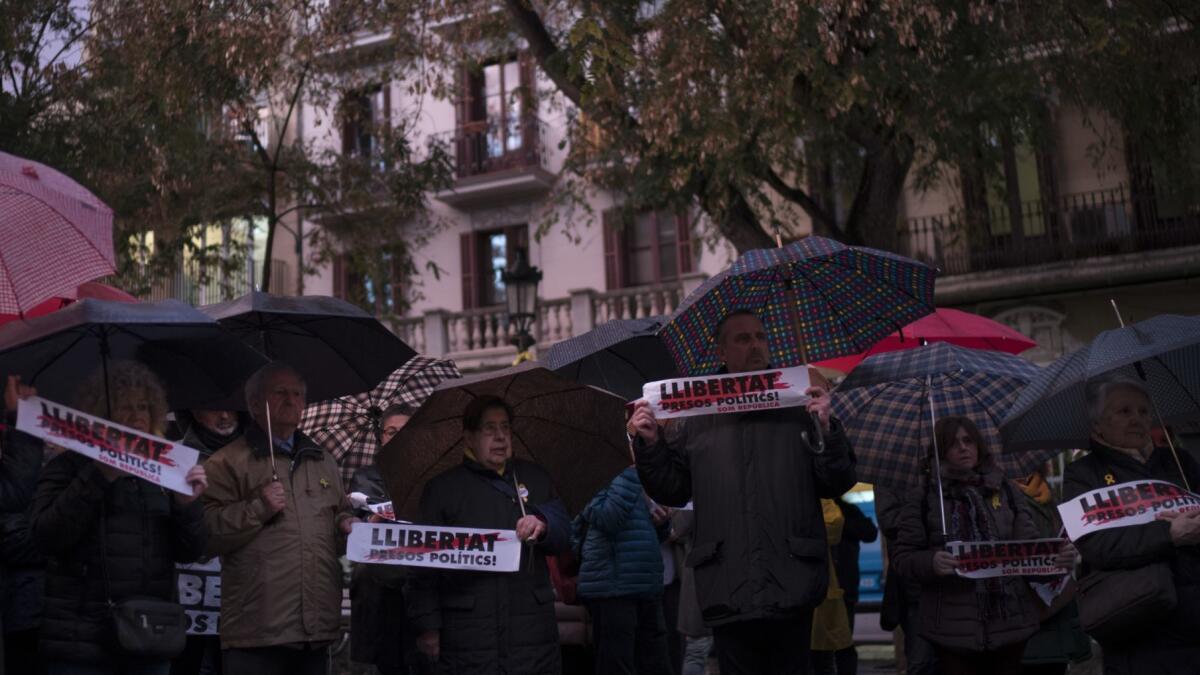Roads blocked in Catalonia to protest ex-leader’s detention
- Share via
Reporting from madrid — Demonstrators angered by the detention of former leader Carles Puigdemont blocked highways across Catalonia and roads in central Barcelona on Tuesday, as the separatist politician remained in a German jail pending a decision on Spain’s extradition request.
Transportation authorities in the northeastern Spanish region said a main motorway remained blocked in Figueres, near the border with France. Demonstrators also stopped traffic in another highway leading to the city of Lleida, and a national road between Tarragona and Valencia.
Early protests that caused disruptions on several roads in central Barcelona, the main city in Catalonia, had cleared by mid-Tuesday morning.
The prosperous region has been marred by largely peaceful protests for more than six months, since a bid for secession from Spain began in earnest.
The Catalan parliament’s declaration of independence in late October following an ad-hoc referendum banned by the Spanish government received no international recognition and provoked a takeover of the regional government by Spanish authorities.
Puigdemont was ousted and fled to Belgium. Last week, a Spanish Supreme Court judge charged the 55-year-old with rebellion and misuse of public funds.
Spain then issued arrest warrants for six of the seven Catalan separatists who have fled the country. Puigdemont was detained Sunday, shortly after crossing into Germany from Denmark.

Defense lawyer Jaume Alonso-Cuevillas, who visited the politician in the Neumuenster prison where he’s awaiting a tribunal’s decision on whether to extradite him to Spain, said Puigdemont was in “perfect shape, both physically and emotionally” ready to fight the request.
“To see him with such determination has been a shot of euphoria,” Alonso-Cuevillas said.
Further decisions on Puigdemont’s immediate future appear unlikely before Easter. A court in Schleswig will decide on formal pre-extradition custody and whether his extradition is admissible. Such cases are typically dealt with in writing, without a hearing, though one is possible.
Germany’s criminal code — unlike Belgium’s, where Spain had earlier sought Puigdemont’s extradition — includes an offense that appears to be comparable to rebellion, the main accusation against the Catalan politician. It calls for prison sentences for anyone who “undertakes, by force or through threat of force” to undermine the republic’s existence or change its constitutional order.
Spanish government spokesman Inigo Mendez de Vigo said Madrid is confident that Puigdemont’s extradition will be granted because the case, he said, is not politically motivated.
“This is not just a Spanish issue,” Mendez de Vigo told reporters at the end of a Spanish Cabinet meeting on Tuesday. “Flouting the rules of a [European Union] member state is also a crime in Germany.”
In a move celebrated by his supporters, the United Nations Human Rights Committee announced that it has registered a complaint by Puigdemont alleging that Spain has violated his political rights.
A group of lawyers and human rights experts lodged the case in March, claiming that Spain has violated human, civil and political rights in its crackdown on Catalonia’s independence bid. The Spanish government has six months to respond.
More to Read
Sign up for Essential California
The most important California stories and recommendations in your inbox every morning.
You may occasionally receive promotional content from the Los Angeles Times.













